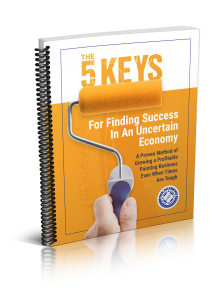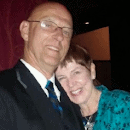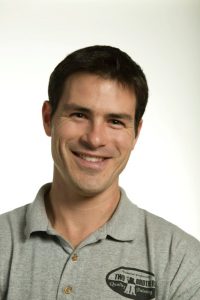3 Signs You’ll Triple Your Painting Business
Growing his painting company was easy because Dan was what I call a “tripler”… Let me explain.
A “tripler” is an established painting company with 3 specific yet common characteristics.
LISTEN HERE AS DAN EXPLAINS HOW HE TRIPLED HIS PAINTING BUSINESS (Full Transcript Below)
#1 – A Big List of Past Customers In the Hundreds (This is where all the value is in a painting business.)
#2 – 12 Months of Zero Communication with the In-House Customer List (Money just laying around everywhere.)
#3 – A “Build Rapport and Email-It-In” Sales Process (This is the typical estimating approach that leads to bidding on price and low closing rates.)
Once these profit-killing issues are addressed, you can often triple monthly sales in a painting company in six months or less.
Yes, I know it sounds too “simple” to be true. Most people think you need a long list of complicated, difficult, technical strategies to see this kind of growth, but it’s simply not the case… (If you need help growing your painting business, request the free report and CD on this page or click here for a free diagnostic marketing assessment)
Here’s the full call transcript with Dan…
Brandon: Hello, I’m Brandon Lewis with the Academy for Professional Painting Contractor and I have Dan Woodford joining me, owners of Two Brothers Painting, and Dan has made some amazing strides in his painting business in a short amount of time. Dan and I met two years ago at the PDCA Expo in Charleston, South Carolina and I remember him well because we had an argument about whether or not you could really sell a painting business for $440,000 as I did with my business and I remember telling my wife in our hotel room that it made me sad that this young talented man had been convinced by someone of a very expensive and incorrect opinion, but I didn’t think much after it. After that conversation it didn’t really cross my mind.
And then Dan attended one of my training sessions at the Expo in New Orleans a year later and we met for a one-on-one during the trade show. And Dan, I think you may have been surprised that I remembered you and specifically that I remembered our conversation on the aircraft carrier that night. And Dan’s been a Platinum member of my elite one-on-one group since February of this year and has impressed me and continues to impress me with his progress and change of perspective.
Dan is also joined on the call with his marketing coordinator Lauren and thank you both for your time. I’m glad to have you.
Lauren: Thanks for having us Brandon.
Dan: Glad to be here.
Brandon: Well Dan, why don’t you give our listeners some background information about how you got into the painting business and what your company looks like today.
Dan: Okay. I got into the painting business out of an engineering career that didn’t go the way that I wanted it to and I was looking for a little more freedom, I found that in starting a college board franchise about 11 years ago today.
Brandon: Tell us a little bit about what your business looks like. Kind of give maybe a thumbnail sketch of how many folks you’ve got, the markets that you serve primarily.
Dan: Sure. And maybe I’ll give a background too. In the last ten years I’ve come to recognize that my business was not necessarily growing. I would say it was changing but not necessarily growing. Things have begun to dramatically change in the last year or so, certainly good part due to our consulting efforts through the end of the year Brandon. What it looks like this year is ten full-time employees. What it looks like is as of this year doing more than three times the business that we did last year. We’re still trying to figure out where our end goal is, but we think well over three times what we did last year is what we’re headed towards.
Brandon: You serve the residential market you were starting to say?
Dan: Mostly, yes. We do some commercial work. We largely serve the residential market. We do some carpentry around the edges, but primarily we’re painters, interior and exterior.
Brandon: Well, let’s talk about this, it’s a question I always like to ask people I think it’s very interesting. It intrigues me. Dan if you went down to Sherwin Williams, went to the paint store in the morning and if you asked most of the owners what they’re doing to grow their business right now I promise you’d be shocked by the replies. Most have never spent really a penny or an hour learning about the business end of the business and that’s where all the money is made, in particular sales and marketing. What ignited your interest in becoming a serious student of business growth in your painting company? I mean I’ve met you two years in a row at an educational event. What, when and how did you decide to just start looking for business growth information and then obviously if you’ve tripled your business or are on the way to doing it, there’s something that changed even after that.
Dan: Right. Well, I guess it’s fair to say that everybody has their why, what have come to known as your why, and I have a strong why, something that I’m passionate about. For me that’s just inability. It’s a healthy happy human future and to me that’s super important. And I guess I’ve always had big aspirations. I wasn’t necessarily able to put my feet on — to put that on the ground. I actually read a book about two years ago that got me going called The Big Leap, and I suppose that I connected to (inaudible 04:59). If I’m going to get funding for these ideas that I have I better get going. And so I guess that book helped put my feet on the ground. I had a partner that I joined up with who very much was in that same philosophy of he was passionate about growth. I took on some of that passion and I came to realize that that was going to take me where I wanted to go.
Brandon: Well, so we went from there to the PDCA, the second conference and you and I got together. I remember us talking in that loud and noisy trade show environment and we started working on the business I guess in a way that I think is very straightforward but that most people feel is unconventional at the outset, but it’s really similar to all the processes you see in other industries, retail, politics, fundraising, non-profits, and we started applying it to your business. Talk a little bit about your efforts to reach out to past customers and generate profits quickly because in my opinion it was well executed. You may think you struggled with it. Maybe you did a little, but I believe that the results are more important than how ugly it feels to you because the results reflect how it feels to the customer and that’s really all that matters in the end because they’re the people who write the checks. So you had some pretty amazing results. Would you mind sharing some of those numbers and telling your story about customer reactivation? That may be why you Lauren handy. I don’t know.
Dan: Sure. Yeah, Lauren has been a big part of what’s been going on here and the primary part of it I would say that basically in helping fulfill some of the ideas that you set us onto Brandon, and by the way I was surprised your memory is a little better than mine. And the PDCA has been a big a big part of what’s taken us here as well without a doubt. So this campaign that Lauren has managed and I would say I have helped her with to a degree, maybe we co-managed, we’ve gotten a lot done. We’ve reached out and talked to our previous customers. We have begun admittedly only very recently taken the (inaudible 07:34). We just had a big pow-wow about that today and realized just how far the customer reactivation campaign went, or at least how many previous customers and friends we managed to reach out to in the first four months of this year. It seems to say the least likely that the campaign had a lot to do with those results which we determined to be certainly over $100,000 worth of direct results from the client reactivation campaign and people that were on that campaign reaching out to friends contributed at least 15% of that through the referral program that you had suggested.
Brandon: Well, that’s an amazing and here’s the reason it’s so amazing, and if there’s a big takeaway from this phone call, one of many I assume before we get off the phone, is that we are in a business of small numbers. And by that I mean people have been told a lie about branding their community. Well, you run out of money before you can brand a community and financially it’s not necessary to brand a community. You just need to build and keep the relationship you have with a very small group of people. Small numbers are big deals in this business. It’s very expensive to build a customer list and your customer list do you remember how large it was Dan? Or how large it was at the outset of customer reactivation and what it settled into?
Lauren: It was under 900, you know, around 850.
Brandon: So 850 people and I’d say I think if I remember right about 60% of those or so were customers and the rest were people you had written estimates to who weren’t customers, were unconverted estimates. Did I get that proportion about right or is it different Lauren?
Lauren: Yeah. I think that’s probably accurate.
Brandon: So it goes to show you that even people that didn’t do business with you we tend to call them tire kickers and time wasters and some of them indeed are, but a lot of them are referral sources and future customers and maybe the time wasn’t right or maybe our sales process wasn’t strong enough to make them buy and we lost a price. Or something like that. Do you remember out of that exactly, and I’ll ask one more question and we’ll move on, about how many estimates total came from that, or maybe closed or booked, you probably haven’t completed them all, but booked projects, do you have an idea?
Lauren: We think about 40 are booked. I don’t know how many actual estimates came out of that, but it’s possibly bigger than that.
Brandon: Okay. Well, that’s a good number. That gives us something to wrap our minds around. So talk a little bit before we move away from customer reactivation where are you year over year from a sales standpoint? Because you’re in my Platinum One-on-One Group. It’s in my notes. If I deviate from our outline here I will completely mess the call up, so I can’t look away. I’m a man. I can only do one thing at a time. But you said that your year over year numbers were quite different. What did those look like year to date so far?
Dan: Okay. I guess to put that in perspective we just kind of did an oh wow because last year we produced $210,000 worth of work and when you consider that, you know, over $100,000 worth of work can be generated by contacting previous customers and asking them to refer you that seems pretty substantial. But overall, it seems that there is a lot of indirect results that came from that campaign and from some of our other efforts this year. So far we’ve booked $440,000 worth of work as of today’s date, August 3rd. So we’re already more than double what we did last year. And we have more than a third of the season to go as far as the bookings.
Brandon: Well, that’s great and don’t give up on the winter. I always tell people that. Sometimes people kind of slow the train down headed into winter and I’ve had some people, it’s not like it is in the spring, but I’ve had people especially with commercial which we need to get into no later than the end of September to have the maximum results from that Dan, I’ve seen people hit huge yearend surprises with people spending the last of their maintenance painting budget.
Dan: That’s what we’re planning on. We’re going to raise it up.
Brandon: Yeah. Don’t give up. Don’t give up. We’ve got more to do. So let’s shift gears here. We’ve been working on the power paint presentation process lately and you’ve been bolting on certain aspects of that. Can you share how maybe your perspective on estimating has changed and what alterations you’ve made to your process versus what it was like maybe at the beginning of February this year?
Dan: Yeah. So the estimating, one of the most profound things that we’ve changed about the estimating process I would say — well one of the most profound things that we’ve done at your insistence is giving estimates on the spot. And one thing that’s enabled to do that is us making early commitment to get software that would allow us to efficiently handle estimates. There are some other minor things that have also been contributing that we’re beginning to do.
Brandon: So y’all started I know bolting on prepositioning. Your follow up compared to what it used to be is much more thorough. And I think you put together your company story book unless I’m making that part up. I may be leaving a few parts out, but you really probably bolted on more than you recall.
Dan: To be honest, we’ve really just begun to do that and it’s actually pretty hard to speak about the results of that yet, but we expect that to be helpful for sure.
Brandon: Very good. Let’s talk about running a painting business and how it can be overwhelming. I know there was a point maybe a couple of months ago where you had to get kind of serious about being better organized because as you mentioned when you 3-X your business and get to where you’re 2-X halfway through the year or two-thirds of the way through the year where you were the year before which means you’ll probably get to 3-X that’s a big change for an owner. And so you got better though at organizing and prioritizing your efforts to try to get some things done with less stress. Can you talk about some of the things you did that contributed to accomplishing that or making the growth more manageable?
Dan: People is definitely one thing that helps. Lauren has helped tremendously.
Lauren: Dan giving himself one day as an admin day has definitely helped him. And he would not have done that if you hadn’t insisted.
Brandon: So talking about basically, and these two questions dovetail into it and to reiterate and clearly state for the people who are listening, I suggest that all owners pick a day, Wednesday, Tuesday, Thursday are good days, where all you’re going to do is focus on marketing, sales or organization because there are only two places that we really make money in this business and that’s by communicating more effectively or more often or by organizing our processes or developing processes where they’re absent. That’s where all the money is made in this business. And he couldn’t have done that if he hadn’t brought Lauren on and delegation is something most owners avoid or either fail to pull the trigger on until it’s too late. Can y’all talk a little bit about how the Core 5 Systems were able to be delegated to Laura, someone we referenced in our nomenclature here at the Academy for Professional Painting Contractors is a marketing coordinator. I know she does more than just that, but someone who takes the Core-5 Systems, once they are understood well by the owner, and helps implement them. Can you talk, either Lauren or Dan, about that?
Lauren: Yeah. I mean it’s definitely — I mean Dan was getting overwhelmed in general so then to take all these new processes and implement them himself I don’t see that would have happened. And like you always say, just get it done. It doesn’t have to be done perfect, which is —
Dan: A problem.
Lauren: — yeah. So that’s the kind of words to live by over here. So what we do is we both go through it in our own time. I try to do all the templates and get everything done and it might not always be perfectly, but then I’d bring it to Dan, we’d go over it again so that we would both have a better understanding as well as two different views looking at it. And that goes for just about every step of the process. But I think that I’ve helped organize him a little bit, organize this little process that I just don’t think that he would have had the time or patience for if he hadn’t brought me in. There were times when it was overwhelming for both of us, but just putting our heads together, meeting for a few hours every Wednesday during his admin days, and has helped it all come together and I really think we’re doing a good job of implementing stuff. And again, as you say not perfectly but we’re getting it done.
Brandon: And that was one of the proudest calls I think I ever had with y’all is where we just got on the phone and there was just this whole bunch of stuff got done. And I think it finally clicked as so often it does with people, you know, you get almost 100% of the benefit in marketing when something that works pretty well is out the door. You get 0% of the benefit when it’s still sitting on the drawing room table waiting to be perfected. And frankly, most people expect so little out of their painting contractor from a marketing and sales standpoint that when anything shows up they’re delighted much less something that’s proven to work and I’ve been amazed at how quickly y’all have kind of gotten on the just get one little piece finished, we don’t have to do it all at one time bandwagon. It’s made a big difference and y’all have worked together quite well.
How many hours, I know it’s changed a little bit, on average were you helping Dan in the office?
Lauren: I would say about — if I could do ten a week that was good. We could always use more and I think we’d be further along if I could have put in more hours, but you know, we’ll just keep getting more efficient at it I think.
Dan: Right.
Brandon: Hours just to repeat because there was a little bit faint, ten hours a week, most people think that when you get a marketing coordinator for them to have any impact their butt’s got to be in a seat 40 hours a week and that’s been proven in your situation not to be the case. I tell people it’s not the case but they have a hard time swallowing it. But a little bit of effort in marketing and sales consistently applied week after week even in small doses can make a huge impact and that’s another takeaway I want people to think of. It’s not the person who when they’re out of shape they can’t think I got to get my shoes on and walk a mile, in their mind they think they have to run the Boston Marathon. Well, that keeps people from getting off the couch and taking the first few steps. You just have to do it one day at a time one step at a time and y’all have done that quite well.
Dan: Right. I have a small aside that is related to that as well.
Brandon: Well give it Dan, nobody’s stopping you.
Dan: Okay. Yeah. One thing to say in terms of reaching out and having other people help, you can’t do everything yourself. One thing I would say to people out there is don’t try to do sales and production all yourself. Don’t try to do everything yourself. One thing that’s contributed is we have Jonathan Palmer, who’s actually been helping us with our production. So basically handling one whole side of the business. Now delegating that task has been tremendous. All of the people involved we’ve had high expectations of. So under him he has delegated a lot of the tasks related to production. So he is the head of production. And we expect that our guys not only produce, our painters, but that they also help us with our marketing. So early on that was one thing that we did is we banded together. We had a marketing day. And we pushed through and we called 500 people in a single day by having six people making phone calls and had a call party. And we actually did that two weekends in a row.
Brandon: Well again, thinking outside of the box, it amazes me how people, and it kind of varies company to company and owner to owner, how people perceive the roles and how somebody who’s enthusiastic and encouraging can put people into situations that other folks would say are impossible or improbable and come out on the other side with a good result such as what you have. So you’re to be commended for thinking outside of the box and adapting to a situation that was probably outside of your comfort zone or so it felt when we first started working together and you’ve pushed past that boundary which is really important.
It’s been a pleasure having both of you on this program. Those are the big things I wanted to cover. But I’d like for you both to maybe leave us with any closing thoughts you have, any words of wisdom, anything that has been remarkably helpful to you or anything that kind of summarizes what you’ve learned about business growth since we started working together.
Lauren: Well, I’ll quickly just give some more credit to the referral program and the gifting. People have such a positive response to that. We just got off the phone with a customer who was receiving a donation in her name for having a referral and it was as if it was Christmas morning or something and she was saying how she was giving out our name to everybody and, you know, just couldn’t be happier with the work. So that’s just nice. It’s nice to hear happy customers and to give them something. I mean I think we’re really proud to hear (inaudible 00:24:18) and that’s just been a bigger thing than we ever thought because we kind of were not skeptical but just didn’t put that as one of our priorities and it’s been good for us and the customers.
Brandon: That’s Dan’s middle name, Dan Skeptical and Doubting Woodford I think.
Dan: Well, my closing remarks might be that that’s my middle name, Skeptical and Doubting. I’ve changed that to Open Funnel, you know, open to new ideas, Dan Open to New Ideas Woodford perhaps, but yeah a lot of good things happen when you open up your mind to the fact that you really can do what you want to do. You put your mind to it and you really can. It pays to be open minded for sure and to build your team and Brandon thanks for being part of our team and for all the help that you’ve given us.
Brandon: Well, I’ve enjoyed it. I know sometimes I’ve had to be the stern and loving parent on the phone and when I don’t do that I’m either doing that or I’m giving Dan and Lauren a hard time. So they’re both very kind to put up with me. I’ve enjoyed it. When I go home and I get to talk to my wife she asks me what I do, you know, “What’d you do today honey? Did you have a good day?” And I love on my Platinum call days being able to talk about y’all two, being able to talk about other folks, and there are families and lives attached to every business and when we can improve those just by changing what we do we’ve done something great. I mean you’ve employed more people that’s no small thing. There are folks out there counting on both of you to put food on the table. So our jobs as entrepreneurs are big deals.
So thank you very much both of you for being on the call. I’m going to close us out. That’s a great place to wrap things up. Stay tuned as we reveal more stories and strategies of financial success from owners just like Dan who are taking control of their painting businesses and their futures. Until next time I’m Brandon Lewis with the APPC signing off.
The 5 Keys for Success in ANY Economy

Discover the key to unlocking the hidden income potential in your painting business.
Hear What Other Members are Saying:

Jim and Lorraine
“Our first campaign reached $60,041.98! That's a huge percentage of our annual sales! You don't pick the peach orchard just one time. Different peaches ripen every day. Thanks for encouraging us to keep after it!”

Eric
“15 requests for quotes and closed and/or completed $23,000 of work and I still have a few more to do. Conservatively this campaign will net $25,000 in found money in the first 45 days! Thanks Brandon!”

Torlando
“This year has been the biggest year of growth for us. We're double where we were last year. I realized the real money in this business is in the marketing of the services - not the doing of the services.”
The 5 Keys for Success in ANY Economy
Discover the key to unlocking the hidden income potential in your painting business.


